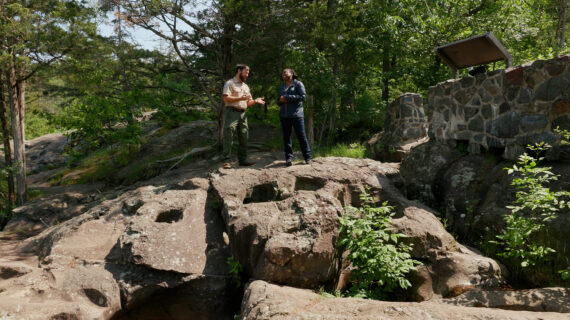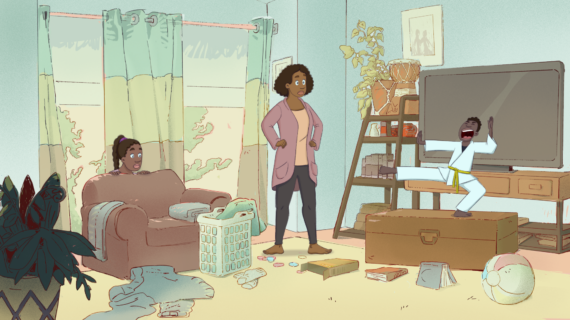Frederica Freyberg:
Now back to health news. We averted the so-called fiscal cliff a week and a half ago, but still looming after the tax hike on the over 400k set, federal spending cuts that are supposed to be worked out in the next couple of months. Those cuts are designated to be 8.2% across the board to domestic discretionary spending unless congress takes a more careful approach. In that pot of domestic discretionary spending, federal grants that fund scientific and medical research, the UW-Madison ranks in the top five of all research universities for the amount of money coming in from those types of grants. The National Institutes of Health alone awarded UW-Madison researchers hundreds of millions of dollars, $175 million of that going to medical research. So what happens if, or perhaps more accurately, when that NIH funding is cut? For that, we turn to the associate dean of Basic Research at the UW School of Medicine and Public Health, Richard Moss, and thank you very much for being here.
Richard Moss:
It’s my pleasure.
Frederica Freyberg:
So are research institutions like UW-Madison sounding the alarm over this?
Richard Moss:
We absolutely are. This is something that actually has been a pattern, oh, for the last several years, where in the NIH makes budgetary allocations to grants. But because of the typical funding by continuing resolution, actually deliver 10% fewer dollars than are actually promised in the award notices. So we have worked through our congressional delegation obviously, and also through organizations, scientific and medical organizations, to make our case heard.
Frederica Freyberg:
So just to back up a little bit, the NIH, kind of, made this preemptive 10% cut in these awards just this fall. So what does that do to the ongoing research projects at UW School of Medicine and Public Health and elsewhere?
Richard Moss:
Yeah, it does have several immediate effects. If in fact the award amounts are 10% less than originally promised, then the research work that is done is 10% less. But we really have to translate this into the people who are involved in research. So what would happen under this kind of budgetary situation is that we would defer hiring until the budgetary situation is cleared up. And so it becomes impossible to start a research project really at full steam until we understand exactly what our budgets will be. We also get into a situation where a grant is receiving continuing funding. In other words, it’s not its first year but its second or third year, and the fact that 10% of the funding now is being withheld, means that work is disrupted.
Frederica Freyberg:
And so what has been the reaction on the part of researchers and the people working on those projects and the people awaiting the results of those research projects?
Richard Moss:
Well, what we find with our faculty, of course, is that we all, as faculty, are really accustomed to these kinds of rescissions. Not that we accept them, but they have come before, and we have learned coping techniques. And one of the coping mechanisms really is to defer the start of important research.
Frederica Freyberg:
What is an example here at the UW-Madison of NIH-funded research that resulted in real life medical implications for patients?
Richard Moss:
We have, as an example, a childhood asthma study, which is a longitudinal study of children with asthma and including their families. And we have perhaps the flagship, really the top program in childhood asthma in the country. This has been funded now for ten years. It is a longitudinal study. We are following families over 10 and 12 years, and anticipating following them to adulthood. These people now suddenly are faced with the prospect that the research project in which they have been participating will now not be funded, will not be active. So this does disrupt, not only the research, which is very important, and important enough that NIH has invested funding over many, many years, but also involves relationships between study subjects and the research coordinators who work with them. If we have to lay a research coordinator off, we have disrupted that relationship of trust and communication.
Frederica Freyberg:
And so we are talking about this preemptive 10% cut that’s already been made and still looking ahead to potentially more cuts. Now, the dean of the UW medical school says we are in danger of losing a generation of biomedical researchers because of this. Very briefly, in less than a minute, why is that?
Richard Moss:
Unfortunately, the statement is absolutely true. And there are a couple of reasons, as you think about it. First, it becomes very difficult to obtain research grants in an environment like this. The NIH, to its credit, has tilted the tables a bit toward the beginning investigator, but the beginning investigator is beginning for only one grant cycle. So when they come in for renewal of their grant, they come into the same sort of environment where fewer than 10% of worthy grants are funded. So this is discouraging. It really has some of our best and brightest people thinking that there are better careers to engage in, given the uncertainty of support for biomedical research.
Frederica Freyberg:
Richard Moss, thanks very much.
Richard Moss:
Thank you.
Search Episodes
Related Stories from PBS Wisconsin's Blog

Donate to sign up. Activate and sign in to Passport. It's that easy to help PBS Wisconsin serve your community through media that educates, inspires, and entertains.
Make your membership gift today
Only for new users: Activate Passport using your code or email address
Already a member?
Look up my account
Need some help? Go to FAQ or visit PBS Passport Help
Need help accessing PBS Wisconsin anywhere?

Online Access | Platform & Device Access | Cable or Satellite Access | Over-The-Air Access
Visit Access Guide
Need help accessing PBS Wisconsin anywhere?

Visit Our
Live TV Access Guide
Online AccessPlatform & Device Access
Cable or Satellite Access
Over-The-Air Access
Visit Access Guide
 Passport
Passport


















Follow Us